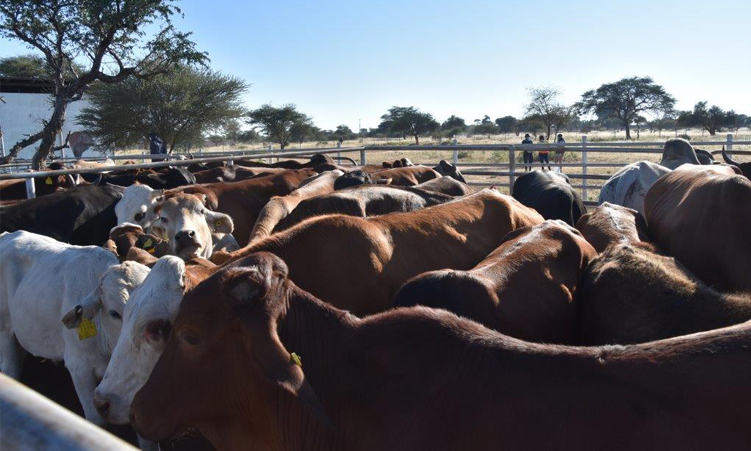A Number of farmers have expressed concern regarding the non-payment of cattle delivered to the Meat Corporation of Namibia (Meatco) for slaughter.
According to Rian van Wyk, cattle farmers have an agreement with Meatco for payment of cattle to be settled within 30 days of delivery but he has been waiting for a payment of N$10 million for 60 days.
“I do not know when they will pay me, but meanwhile I have a bank loan to service, workers to pay and feed to buy for the remaining livestock,” he says.
He further says this is a recurring problem, as last year about 245 commercial livestock farmers faced viability problems following Meatco’s failure to pay N$320 million for cattle delivered to the abattoir.
Another farmer, Echardt Basson, says he opted to deliver slaughter cattle to Meatco’s rival this year and also sell some livestock through auction as he wants to reduce his herd by 200.
“Dealing with Meatco is risky, because you never know when you will get paid in this drought year, when the need for a stable cash flow is vital,” he says.
He believes it’s better for him to get less from other streams than a huge “mirage” from Meatco that never comes.
“Better a sparrow in hand than a dove on the roof,” he says regarding the payment situation.
Andre Esterhuizen says although he is booked to deliver cattle to Meatco in May, June and July, as part of destocking in the face of the drought, he is hopeful he will be paid for his cattle.
In support of the farmers, three agricultural unions wrote to finance and public enterprises minister Iipumbu Shiimi to request his intervention in facilitating payment from Meatco.
In the letter dated 26 April, Namibia National Farmers Union president Adolf Muremi, who also sits on the Meatco board, Namibia Agricultural Union president Thinus Pretorius and Namibia Emerging Commercial Farmers’ Union president Ndahafa Nghifindaka said Namibia can only consume a third of the meat it produces, and the country is reliant on effective export value chains.
They noted that export abattoirs, as the last buyer of beef for export purposes, also stimulate the total cattle value chain.
“If Meatco producers are not being paid on time, history has showed that the auction prices are also negatively affected. During April 2024, sudden delays which were caused “due to unforeseen circumstances” again delayed the on-time payment of Meatco producers.
“Since producers experienced delayed payments in 2022 and 2023, producers can ask if or when delayed payment will again be experienced in 2024. This repeated inability of Meatco to timeously compensate farmers continues to undermine their trust,” said the unions.
“We are, therefore, writing to express our concerns regarding recent payment delays and cancellations of slaughter slots experienced by Meatco producers.”
The unions said in addition, northern farmers cannot deliver high-quality livestock to abattoirs for slaughter.
This is because of low producer prices paid to northern communal area (NCA) farmers, which are 40% lower than prices received south of the veterinary cordon fence, according to the Livestock and Livestock Products Board of Namibia (formerly the Meat Board of Namibia).
“These low prices inhibit farmers to expand and produce more quality cattle, which threatens not only the operational viability of NCA abattoirs, but impacts farmer livelihoods and the broader industry,” the unions said.
They implored the government to provide an NCA equalisation fund to cater for the gap in prices, while international markets are being developed and the Code of Good Practice is properly enforced.
“The ongoing drought presents an ideal opportunity for Meatco to navigate their challenges by achieving production targets and reducing financial strain.
“However, this can only be achieved through proactive and transparent communication and with guaranteed payment and slaughter assurances to producers,” said the unions.
The unions asserted that producers need assurance that they can rely on Meatco during these uncertain times.
Questions sent to Meatco chief executive Mwilima Mushokabanji on Tuesday were not answered.
However, Muremi told The Namibian Meatco’s historic debt keeps eating away at its revenue.
He said Meatco had recorded a loss of N$118 million in the 2022/23 financial year, and despite a slight improvement in revenue, historic debt still negatively impacts the company.
“Despite the slight performance in terms of throughput and revenue, the business continues to be haunted by its historic debts that negatively affect its debt-to-equity ratio and discourages the commercial banks from making facilities available that cover the company’s working capital requirements,” Muremi said. – email: matthew@namibian.com.na
Stay informed with The Namibian – your source for credible journalism. Get in-depth reporting and opinions for
only N$85 a month. Invest in journalism, invest in democracy –
Subscribe Now!






